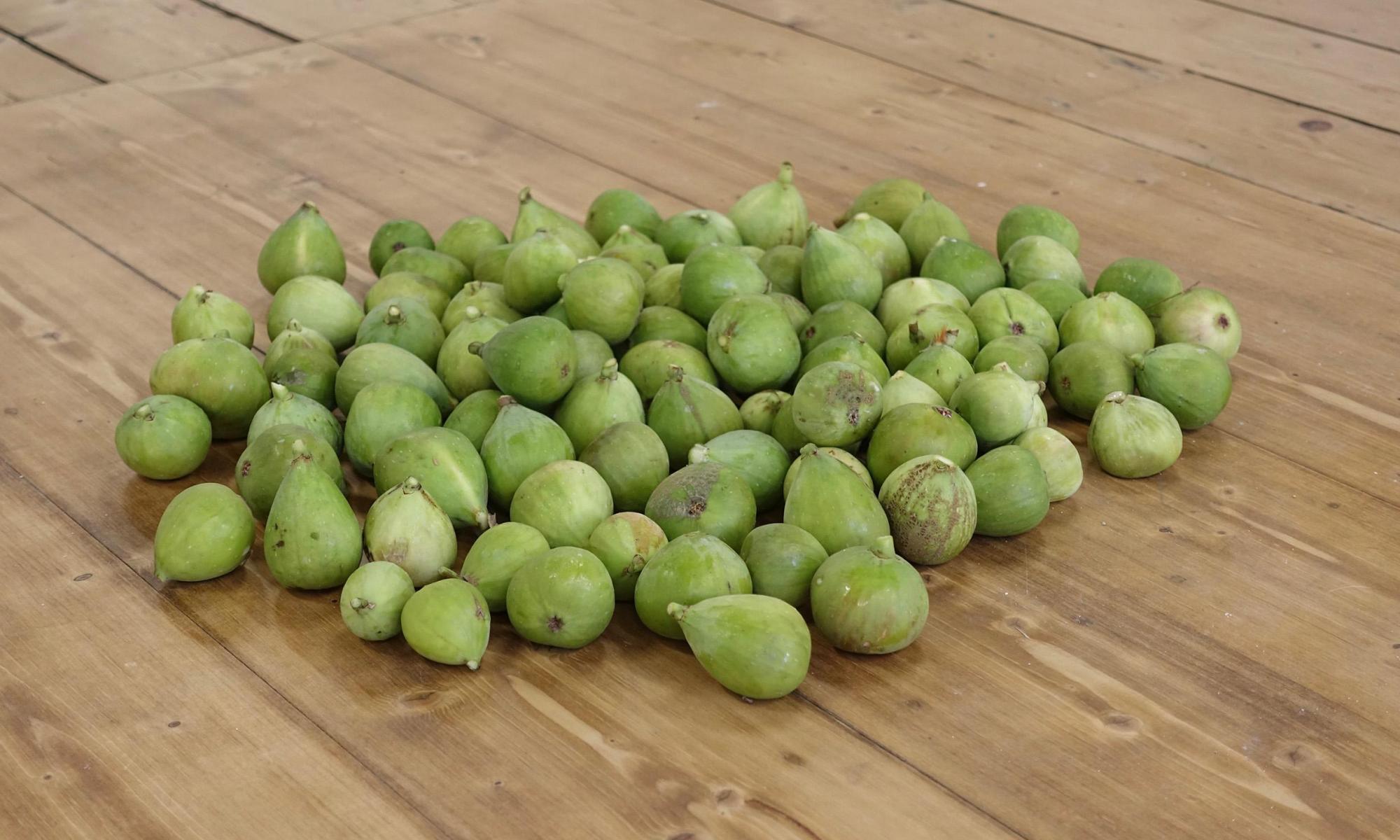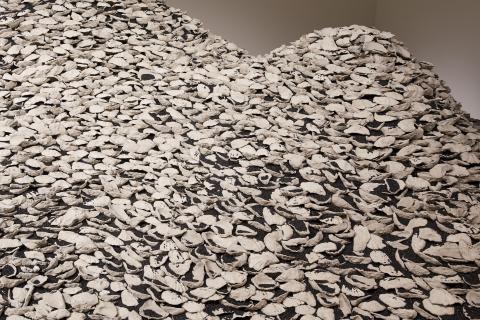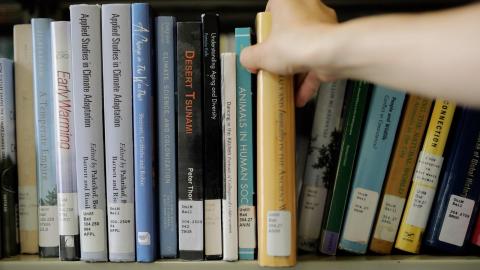The New Learning Centre
‘Capitalism asks: From this given piece of land how can I produce as many crops as possible for the market with as few men [workers] as possible?’
—Max Weber, ‘Capitalism and Rural Society in Germany’ in From Max Weber: Essays in Sociology
‘Never Stand Still’ is a fitting slogan for a university anxious to digitise the entire learning process and move everything—including teachers and students—online. Apropos of Weber’s question on behalf of capitalism, it would be easy to think of the university as the land, teachers as workers, and students as crops, but semester by semester, course by course, it becomes more complicated than this. Like most slogans, ‘Never Stand Still’ doubles as a method, one that describes the current state of the university sector even as it has ceased to be the official maxim of the institution we currently teach at (following yet another elaborate and expensive process of rebranding). The velocity of this method seems directed not only at moving interactions between teachers and students onto digital platforms, but also creating a market for these interactions.
This isn’t simple work. As the historical avant-garde has shown, the transformation of life is difficult, no matter how compelling an image may be. Unlike a picture, life refuses to remain still. This makes us think that it might be time to consider upper management as the true inheritors of utopian, avant-garde thinking. While Alexander Rodchenko is probably not spoken of in management meetings, they seem to have heeded his warning that ‘Art which has not entered life will be numbered and handed over to the archaeological museum of antiquity.’ [1] Management realise, we think, that if their utopia is going to succeed it cannot be thought of as a static concept. Their art is about fluidly and continually mapping their vision onto the space and time of learning; it is a methodology for ‘overtaking the role of reality,’ as Ernst Bloch once said to Adorno, thinking of utopias. [2] Far from being dead, buried or immaterial, utopian plans are one of the ways imagination materialises, regulating thoughts and behaviour, arranging people and things within an ideal framework. ‘Whatever utopia is,’ replied Adorno to Bloch, ‘whatever is imagined as utopia, this is the transformation of totality.’ [3] Thinking along these lines, the university has never given up on utopian projects, only its tactics have changed. To spend time here, whether as a teacher, a staff member or a student, is to work within management’s dream of transforming pedagogy into a digitised market. But how exactly is this plan crossing the ancient threshold that separates wishes from reality?
To answer this question it might be helpful to take a brief detour and talk about strawberries. In an influential study of a strawberry market at Fontaines-en-Solange in central France, Marie-France Garcia-Parpet showed how markets are deliberately shaped and created—both architecturally and with the introduction of new technologies—to approximate an ideal. Through technological and spatial reorganisation, barriers between theory and practice (dreams and reality) can be redrawn. First, strawberries were marketed as economically interesting, where those with profits to gain convinced asparagus growers to experiment with the fruit instead. Second, a whole set of ‘psychological and material investments’ made the market possible, including the advice and guidance of an economic advisor (who admitted to being excited about his involvement but not having much at stake). Garcia-Parpet shows the extraordinary material and social effort that goes into the making of this market. Instead of following the logic of an ‘invisible hand’—where self-interest guides a ‘free market’—‘the functioning of a market needs to be seen as the object of perpetual vigilance on the part of its organizers, who have to struggle against all kinds of actions that market participants deploy to intervene in the market process.’ [4] By looking at the specifics of how strawberries come to be priced and sold, the ‘perfect market’ is shown to be a process where struggle and constant work (including interpretation, advice and intervention) are inherent to its creation and maintenance.
Coming back to the university, then, management’s latest project (its very own strawberry market) is called Smarthinking. This service is currently being trialled as the new and official online writing support for students. Its services are available 24 hours a day, 7 days a week, and it promises ‘better grades, essays, resumes, and careers.’ Owned by Pearson PLC (which began as a construction company in the 1840s, switched to publishing in the 1920s, and is now one of the largest education services company in the world) Smarthinking is sold by pairing convenience and student stress. As copy on their website reads: ‘Students face ever-greater personal demands and academic challenges. When they need help, they need it now—and if they can’t get it, they fall behind, fail to complete, or drop out.’ The message is clear enough: education is a high-speed train and one is either on it or not at all.
To make this service official—that is, to turn it into a market—the university is expanding its definition of plagiarism to include all other forms of outside tutoring assistance that is not Smarthinking. Under the question ‘How does it work?’ on the university website we read: ‘Smarthinking is the sole legitimate external provider of tutoring for writing… and students will be given 2 hours of Smarthinking time. Students can use this time to connect to a Smarthinking tutor in a real-time session or submit their writing and receive comprehensive feedback on their writing.’ So not only are students obliged to feed the ever-growing database called Turnitin, a for-profit company that scans their submitted work for plagiarism, they are now also being ‘given’ a 2 hour-limit with a for-profit online tutoring service, corresponding with ‘tutors who know their stuff’ (according to the Smarthinking website) and who, as far as we can tell, could be anywhere in the world. The effects of this change are significant: 1) the university’s policy on plagiarism is moving from its original definition of passing someone else’s work off as one’s own to speaking with anyone other than Smarthinking tutors; 2) the simple act of asking for help with academic work from the university transforms the student, both theoretically and practically, into paying datum; and 3) the (never-ending) practice of practicing writing is now subject to a countdown. Your allotted 2 hours starts now!
As Garcia-Parpet showed with strawberries, this doesn’t ‘just happen’. Nor is it ‘more efficient’, as the familiar argument often goes. A frequently asked question on the Smarthinking website, we read, is ‘What if I already have on-campus tutoring?’ The response: ‘If you do, that’s awesome. Sometimes, we can be there when they can’t—at night, on weekends, during holiday breaks, or if you need help with a subject they don’t support. If they’re especially busy (say, for example, during exam week), we might be able to help you sooner than they can. And, sometimes, it just helps to have a second coach: someone with a different way to help you understand.’ So on one side, the university makes it mandatory to use this pedagogical service (‘the sole legitimate external provider’) and on the other side, the company presents itself as an unobtrusive, alternative option, picking up the slack of an institution unable to offer appropriate and timely services. And in the middle, caught in this rip of cognitive dissonance, is the economically interesting subject: the student.
So rather than thinking that a lack of services for students is unavoidable, it is better to see this as management’s approximation of an ideal. Smarthinking could only ever succeed within a framework that replaces what previously existed, namely The Learning Centre. This centre has long assisted students with their academic reading and writing. As teachers, we have often suggested to students that they seek help here and, with frequent visits, have seen their writing improve; building relationships not only with the tutors but with other students dealing with the unnatural complexities and peculiar demands of academic writing. But within management’s new vision, the centre has been subjected to ‘structural changes’ (meaning a considerable portion of its tutors, it is rumoured, have either been made redundant or offered newly crafted contracts). It is difficult to know what effects this will have on student writing and reading, but in a Smarthinking world of online educational services there is little time to ask such questions.
*
All of this has us thinking about another maxim, this time the university’s official motto: Scientia Manu et Mente. The translation of this Latin phrase is ‘knowledge by hand and mind’, a noble ideal to be sure but the death knell of The Learning Centre has shown just how far the university has come from a conception of knowledge grounded in the senses. The economisation and digitisation of teaching and learning can be understood as a process that computer scientists call virtualisation, which describes the production of layers of abstraction that transform tangible things into logical objects. The gap produced by such abstraction obfuscates the infrastructure and labour involved in producing the thing itself. To be clear, we are not arguing that there is nothing sensory to the online realm (a claim that would be ridiculous) but rather that the production and speed of virtual economies confuse and disorient; a process that results in the dulling of the senses and the exhaustion of everyone involved, which helps to enact whatever new normal is being dreamed up. ‘Never Stand Still’ is a maxim that makes organising in the face of constant change near impossible as the ground is continuously shifting beneath one’s feet. So we are talking here not only of reorganising the land of the university but also, through constant destabilisation, a way of creating new lands.
A young Marx wrote that ‘The forming of the five senses is a labor of the entire history of the world down to the present.’ [5] We keep returning to this sentence as we write, passing words back and forth. For if we are to imagine a utopia that differs to the version management is putting forward, it must be one that is attentive to the historical dynamics of sensation itself; to the way learning awakens the senses, catapulting us over the fortress of calculation. Perhaps there is something to be found in the old maxim ‘knowledge by hand and mind’, joining ways of thinking with ways of making, thought with feeling. For what is learning if not an entanglement, a playful confusion, of hand and mind—‘not feeling against thought, but thought as felt and feeling as thought’? [6] We would do well not to lose sight of the hands—hands that craft an essay, hands that tend a field of strawberries, hands connected to bodies whose very presence might offer a type of support, a passing back and forth between thought and feeling, or, as children so effortlessly demonstrate, the radical interplay between world and image. The hands are a material index of labouring and learning subjects—both teachers and students—put to work in the creation of these new and profitable lands.
This creation of new markets in the university sphere can be connected to a longer historical process of industrialisation and precarisation, or what Fred Moten and Stefano Harney call ‘the academic speed-up,’ which has produced a proletarian workforce encompassing both students and teachers. This creation of factory-education is explicitly and implicitly linked to imperial ideology with the mass production of knowledge, feeding the expansionist tendencies of nation states that these institutions are situated within. Indeed, the university itself seeks to expand beyond its own territory, to swallow more and more as it pursues new markets at home and abroad. Pedagogies of critique—such as those concerned with borders, race, gender, sexuality, class, and so on—are not immune from the university’s expansionist impulses, in fact, as Piya Chatterjee and Sunaina Maira tell us, they ‘are fundamentally intertwined with the interests of neoliberal capital and the possibilities of economic dominance.’ [7]
Here we are reminded of the poet Ilya Kaminsky, who speaks of the project of any Empire as the dulling of the senses. [8] The stress of keeping up with trimester schedules, assessment deadlines, research outputs, new marking criteria, changes to contracts, and funding expectations fuels the expansion of this market, and its ‘uplift’ into the digital realm extends the condition of alienation (a dulling of the senses). But the hands that toil are also the hands that touch. A return to the material conditions of the university might require a greater attention to the way the hands lead us to the other senses too. Kaminsky, quoting Federico García Lorca, says the ‘poet is a professor of five senses, not a professor of creative writing… [S]o what is it that senses do on the page, what parts of speech, for a given time period, bust open our senses to us, make them available to us?’ [9] Perhaps it is through the senses that we find our way back to the bodies that have been ignored or made abstract in the production of new markets. And perhaps this attentiveness might help us to find a way to slow down, even as the pressure to move on and speed up increases. This slowness could take many forms. Since even as pedagogy (including pedagogies of critique and resistance) bends to the will of capital, there is something that escapes—possibility remains. We find this quantum of potential in the act of being together in the classroom. As yet, no one is looking over our shoulders when we come together in the classroom: it remains a space to experiment with possibility. [10]
We return to Weber’s thinking here, but this time it is his thoughts on communal action, which is never guaranteed and never universal. Communal action, Weber notes, operates as feelings and belongingness. As he observed, amorphous yet shared actions can occur, such as ‘the “murmuring” of the workers, the disapproval of the boss, the phenomenon of ‘the “slow down” (the deliberate limiting of work effort) of laborers by virtue of tacit agreement.’ [11] Thinking with Weber, we are reminded that the task at hand is to find a way to the outside, to the communal, where chance counters calculation, busting open into the sensory world of thought.
Histories of utopian thinking are often taught as social projects, from novel configurations of the state, urban planning and community. At least that is how we have been teaching them. But given the conditions under which we now teach and students learn, where students teach and we learn, it is perhaps time to consider an entirely different application of utopia: the economisation and digitisation of pedagogy and the move to educational services. A management’s utopia. There are those who might see this as a story of failure, where the world of one model ends up edging in, making use of what already exists, until the previous model (and its world) becomes redundant. But we need to look closely at the relationships that come to constitute knowledge in the first place, since ‘it would be more accurate to say that the confrontation takes place between socio-technical worlds that are struggling to exist, at the expense of other socio-technical worlds.’ [12] We can see now that Weber’s question on behalf of capitalism that we quoted at the beginning is perhaps better applied not to a given piece of land (the university) but the creation of new lands—the digital—within which the university forces students to work. After all, this is captive labour. And yet, is there not something oddly compelling about students and Smarthinking tutors swapping notes very late at night, about what it means to read and write today?
This is why we are proposing, amidst the restructuring of The Learning Centre, a new assignment: write to Smarthinking tutors and ask them about their parent company, Pearson PLC. Or tell them a story. Are they too on countdowns? What is the amount of time they are told they should spend giving feedback? What did they have for breakfast? In a word, chat. It might be our very own utopian project, silly as it is, but it could be the making of a management glitch, where learning goes wayward, and a bigger picture comes into view. For what if instead of hurtling towards education as an online service we did nothing but linger, attach, loiter, forget the petty ticking of clocks, and consider the possibility and provocation of a pedagogy that stands still long enough to feel out that spirited and possible maxim: Scientia Manu et Mente?
[1] Alexander Rodchenko, Experiments for the Future, ed. A. Lavrentiev and J. E. Bowlt, New York: The Museum of Modern Art, 2005.
[2] Ernst Bloch and Theodor Adorno, “Something’s Missing: A Discussion on the Contradictions of Utopian Longing,” The Utopian Function of Art and Literature, Cambridge, Massachusetts: MIT Press, 1988, 3.
[3] Ibid.
[4] See Marie-France Garcia-Parpet, ‘The Social Construction of a Perfect Market: The Strawberry Auction at Fontaines-en-Sologne,’ Do Economists Make Markets? On the Performativity of Economics, ed. Donald MacKenzie, Fabian Muniesa and Lucia Siu, Princeton and Oxford: Princeton University Press, 2007, pp. 20–53.
[5] Karl Marx, Economic and Philosophic Manuscripts of 1 844, trans. Martin Milligan, New York: International, 1968, p. 140.
[6] Raymond Williams, ‘Structures of Feeling’, in Marxism and Literature, Oxford: Oxford University Press, p. 132.
[7] Piya Chatterjee and Sunaina Maira, ‘The Imperial University: Race, War, and the Nation-State.’ The Imperial University: Academic Repression and Scholarly Dissent. Minneapolis: University of Minnesota Press, 2014.
[8] Ilya Kaminsky interview with Rachel Zucker in Commonplace, episode 72. Thank you to Mitchell Cumming for passing this on.
[9] Ibid.
[10] See ‘Dematerialisation of the Classroom (a Lesson in Showing Up)’, http://www.artandaustralia.com/online/disquisitions/dematerialisation-classroom-lesson-showing
[11] Max Weber, ‘Communal Action Flowing from Class Interest’, From Max Weber: Essays in Sociology, New York and Oxford: Oxford University Press, pp. 183–184.
[12] Michel Callon, ‘What does it mean to say that economics is performative?’ Do Economists Make Markets? On the Performativity of Economics, ed. Donald MacKenzie, Fabian Muniesa and Lucia Siu, Princeton and Oxford: Princeton University Press, 2007, p. 341.
Header Image: Charlie Sofo, Seasonal Work, 2017, figs, dimensions variable.




